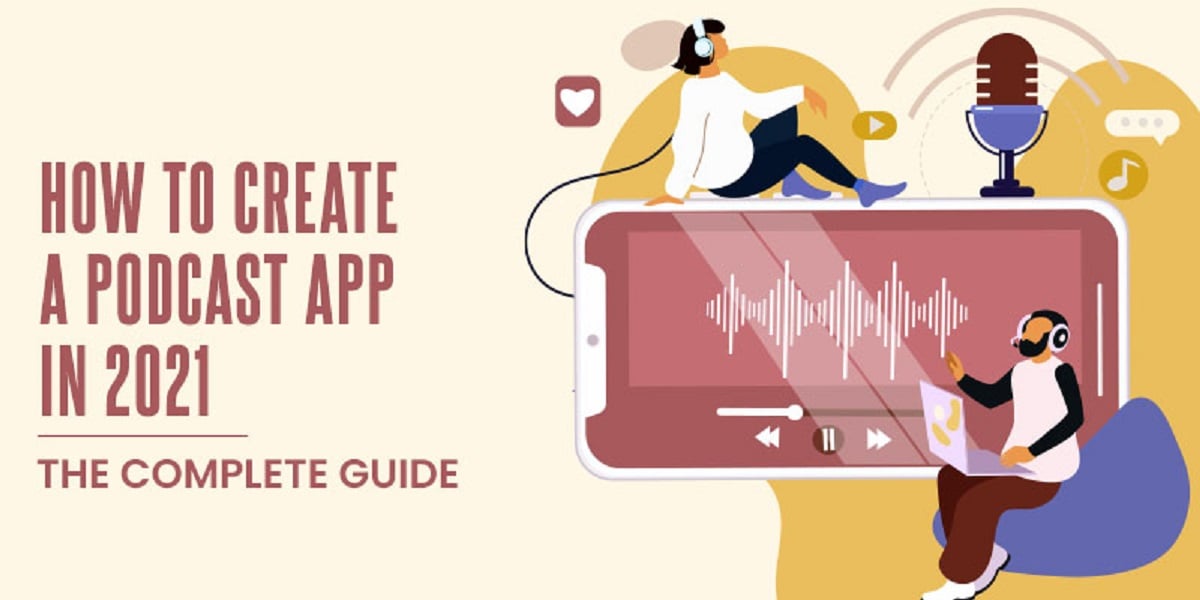In the past two years, Podcasts have reached over 1,500,000 active shows with 34 million episodes globally. It is an industry that's growing at a rapid pace. In 2018, several brands created a budget and spent over $479 million for creating Podcast advertisements. The numbers are expected to be doubled by the 2021 year-end. Content Creators, Strategists, and Marketers are using this tool to increase their online presence and reach more people.
If you're having trouble creating a Podcast, this guide is for you. You'll be learning everything in detail, so let's get started.
What is a Podcast?
A podcast is a pre-recorded audio version covering different topics of interest. Let's say you're watching a video on "How to grow your brand on Instagram?" You can listen to the same information through a Podcast version. It works better as you can plug your headphones and listen to it while you're taking a walk, working out, or traveling.
You have the option to either stream the episode online or download it offline. You can listen to the audio later, even when you don't have an active internet connection. Podcasts typically consist of a specific number of episodes that listeners can access anytime; through multiple platforms, including Apple Podcasts, Spotify, Soundcloud, or Google Podcasts.
Why are Podcasts gaining popularity?
In the 2000s, iPod was launched, which gave the world a new perspective on communication. Back then, Podcasts worked a bit differently. The sessions were pre-recorded, and the files were uploaded to audio machines that attached them to the RSS feed. The word podcast is derived from the combination of "iPod" and "Broadcast."
Audible is an Amazon company that became a platform for accessing downloadable audiobooks, radio programs, and other audio content forms. American Talk shows such as the New York Times and Wall Street Journal bought subscriptions for the recording.
Podcasts may have launched skepticism but have proved to be a progressive technology. It lets users stay in control of when they're listening, their favorite topics, and how they want to stream it - online or offline downloads. With visuals, it's impossible to watch it while working out or walking.
Podcasts have reached a new level of popularity in 2021. One of the biggest reasons would be the accessibility for its consumption. The millennials are focused on juggling a hundred things together. Everyone wants to earn money, become fit, learn new things and develop their skills.
Audiobooks have made it easier for you to read books without actually reading them. This is an excellent option for those who cannot read those hefty pages.
For Creators and Marketers, Podcast has become an accessible platform to reach more people and build their target audience. Anyone can start a Podcast. You don't have to necessarily be famous or have a significant following number. You need to have valuable content that's recorded in high-quality audio. And you will see results.
Is all of this worth the efforts?
Every coin has two sides. Creating podcasts can be worth it for you, or maybe not. The Podcasts' success depends on your end-goals, the value you're bringing to the table, and your willingness to invest the required time and resources consistently. It would be best if you were consistent with your episodes. Just like every other social media platform, you cannot expect to bomb without multiple episodes.
A Podcast helps in developing brand loyalty. You are not only creating content for the listeners but building a community of like-minded people. They support you with every cause leading to your growth. Research shows that 54% of people are more likely to purchase from an android app agency when their name is mentioned on a podcast. Isn't that intriguing?
There are Monetization opportunities with Podcasts as well. Why do you think the most extraordinary creators are making Podcasts? It's a medium that reaches everyone despite physical or geographical obstructions. Advertisers make huge investments through sponsor ads, partnership promotions, or selling premium content. You can earn up to $250000 per listener.
Statistics show that Podcasts have active listeners who are excited about the upcoming episodes for their subscribe shows. On average, an individual is likely to listen to seven shows per week, all different. They spend over seven hours a week listening to various podcast episodes. This is sometimes more than the time spent on Social Media.
So, is it worth it?
Yes, if you hit the right nerves and build a loyal community, you are good.
Do you need to invest money in starting a Podcast?
No. You don't need to invest money in starting a Podcast. You need a laptop/PC, an active internet connection and a Smartphone. Brownie points if you can afford a set-up for professional mikes. It does improve your audio quality to a great extent. But, even if you don't have it, it's completely fine.
You can start Podcasts for free. All you need is a vision with a great content idea. We recommend not sacrificing the audio quality. So if possible, invest your money in a good quality microphone. You might need good editing software, which has been discussed at length below.
How do you start a Podcast?
Identifying Goals: Like every business, identifying your Podcast goals is essential. This helps you outline the content structure, format, marketing strategies, and target audience. Here are a few examples that can help you define your Podcast goal
● Generating leads and increasing visitors for an existing brand
● Starting Podcast as a business idea that sells in the future
● Creating a personal brand as an industry leader
● Having fun and entertaining the audience
● Building a community by discussing crucial social issues
Select a Niche: What is the topic that you want to talk about? What would be the defining perspective for your content? Would it be a solo podcast, rant, experiences, or an interview session? The decision is up to you. It's best to go for topics that interest you the most and the sectors in which you possess considerable knowledge.
Choose a Name: There are thousands of Podcasts out there which means increased competition to get your voice heard. Your name should attract the reader's attention. It shouldn't be something generic but out of the box. Take as much time as you need here but don't make a compromise here.
Bonus tip - You can add your brand name or related keywords in your industry. It would help to rank your Podcast higher on iTunes. For example, Jay Shetty's Podcast is called On Purpose with Jay Shetty, or Gary Vaynerchuk calls his Podcast The GaryVee Audio Experience.
Podcast Description: Once you decide the name, the next step would be the description. You have to be brief, clear, and precise here. iTunes allows you to describe the podcasts with 4,000 characters. Keep an engaging, direct, and well-curated narrative. You don't want to bore the readers at this step since they have just noticed your Podcast. Think of it as a gateway that decides whether the listener would press play or skip your episodes.
Cover Art: What's your Cover art going to look like? The description and covert art hold equal importance. From a visual perspective, your cover art needs to be attention-grabbing and aesthetic. Remember that the first impression is the last impression. You cannot afford to mess that up.
● The cover size should be 3000 x 3000 pixel - Minimum 1400 x 1400 pixels
● The images you use should be of high quality. Go for copyright-free photos. There are tons of Free websites for this.
● The image format is .jpg or .png with RGB colorspace.
● Use minimal text. Some platforms automatically shrink your cover size to fit smaller sections. It would be impossible to read if the words are more than four.
Canva is a fantastic tool that can be used for cover art. You have the free and premium version, depending on your requirement. Photoshop works, but Canva is excellent if you're an amateur at designing.
Decide a Format: The format for your Podcast depends on your topic density. Talk shows or interviews are generally entertaining and fun to listen to. Users don't need to put a lot of effort while listening. For slightly heavier topics like history and Psychology, listeners need to pay extra attention to learn all the information and comprehend it.
Format
● Solo Podcasts work best for sharing experiences.
● Interviews should be conducted for gaining experience from other industry leaders.
● News capsules can be a recap of the significant events happening in a specific sector.
● Multiple hosts create a more engaging and dynamic conversation.
● Educational ones for teaching your audience about a specific topic or skill.
● Case studies to make a point or support social issues.
The Ideal Length for a Podcast is somewhere between 20-45 minutes. But, that doesn't mean that exceeding the limit is a bad thing. If you are going for an hour and feel that the content is precious, your listeners would engage. You can always divide the episode into two parts cutting down the duration.
Make a Schedule: Consistency is the key when it comes to recording Podcasts. It would help if you devoted a few hours every week to make a great episode with all other activities. Follow the schedule and upload the episodes on time. Your audience might be okay with occasional delays, but with frequent ones, you will lose them.
Record your first episode: For Solo recorders, you can use platforms like Anchor, Audacity, and Spreaker to start recording the Podcast. A mobile microphone would work but make sure to sit in a quiet space. For interviews, Skype or Zoom calls work. But ensure that both sides have a good microphone to maintain the audio quality. If you're interviewing in the same room, one microphone will work for both of you.
Editing your Podcast: Audacity is an excellent software for editing audios. It's free, and you can pretty much do the work. Adobe Audition is another excellent software with advanced tools for editing the episode. Make sure to remove any unwanted background noise. Enhance your voice to make it more clear. For Anchor, you have an in-built editing option. If that does not work for you, you can download the audio and edit it in different software.
Popular Podcasts you can check out for Inspiration
1. Tim Ferris - Four-Hour work week blog
This Podcast covers different aspects related to the business sector. The audios usually go up to 48 minutes. It starts with 10-20 minutes of audio essays and then includes the interviews of some famous business tycoons. The equipment used for recording is Libsyn. Two episodes are released every week.
2. Copyblogger - The Lede Podcast
This one is based on Copywriting and Content Marketing. The average duration for a single episode is 24 minutes. Two hosts interview different experts from the industry. Every week a new episode gets released. The equipment used is a Flash player.
3. Convince and Convert - Social Pros Podcast
This Podcast covers Digital Marketing with an average timeline of 48 minutes. It discusses unknown stories or behind the scenes from various industry experts. The episodes come out every week.
Conclusion
Podcasts are transforming the dynamics of Content Creation. Content is not limited to visuals. It's incredible how you can learn, develop a skill, get entertained, or find experiences while walking, running, working out, or traveling. Brands are shifting to Podcasts since the listener base is increasing rapidly. To create a Podcast, you don't need to make any investments. It's easy and free! Communicating your ideas has never been so easy.

